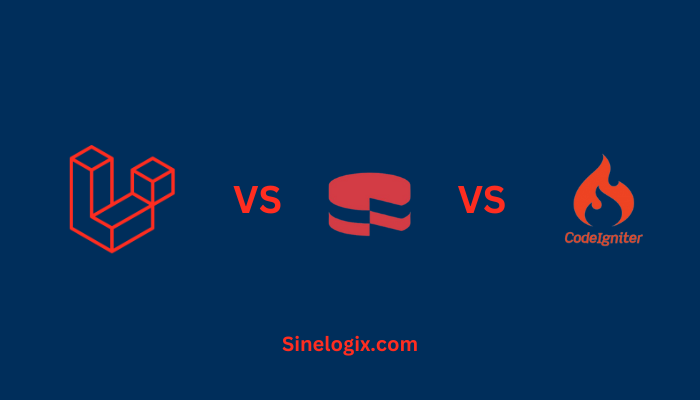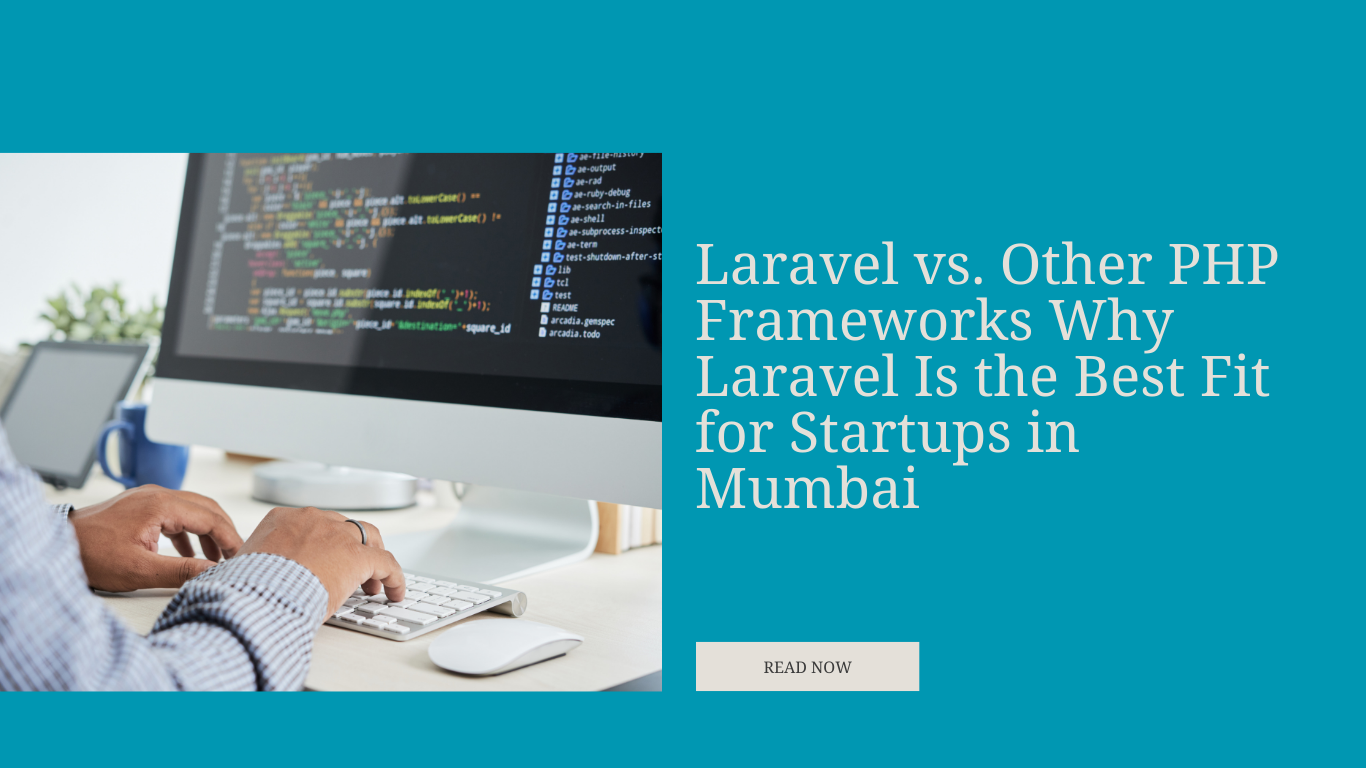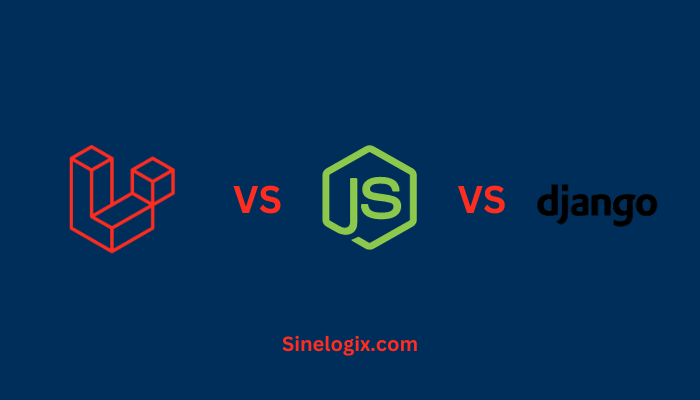Selecting the right PHP framework is crucial for web development success, and among the array of options, CakePHP, Laravel, and CodeIgniter stand out as popular choices. In this comprehensive comparison, we will scrutinize these frameworks across various aspects to help you make an informed decision for your web development projects.
1. Architecture
CakePHP
CakePHP adheres to the Model-View-Controller (MVC) architectural pattern, providing a structured approach to organizing code. Its conventions over configuration principle streamlines development.
Laravel
Laravel follows the MVC pattern, emphasizing elegance and simplicity in code structure. Its expressive syntax and Artisan command-line tool contribute to a robust architectural foundation.
CodeIgniter
CodeIgniter employs an MVC-based architecture, offering flexibility in code organization. While it provides the MVC structure, developers have the freedom to organize code as per their preferences.
2. Learning Curve
CakePHP
With its convention-based approach, CakePHP is designed to reduce the learning curve. Developers familiar with PHP conventions can quickly adapt to CakePHP’s workflow.
Laravel
Laravel’s elegant syntax and comprehensive documentation contribute to a relatively smooth learning curve. The Laravel community actively supports newcomers through various resources.
CodeIgniter
CodeIgniter is known for its simplicity, resulting in a short learning curve. Its straightforward structure makes it accessible for developers looking for a framework with minimal complexities.
3. Community Support
CakePHP
CakePHP has a supportive community that actively contributes to its growth. While not as extensive as some other frameworks, it provides valuable resources and assistance.
Laravel
Laravel boasts a robust and enthusiastic community. Its extensive ecosystem includes Laravel Forge, Envoyer, and Mix, enhancing developer productivity and support.
CodeIgniter
CodeIgniter has a dedicated community, though not as vast as Laravel’s. However, the community actively participates in forums and provides assistance through various channels.
4. Scalability
CakePHP
CakePHP is suitable for small to medium-sized applications. While it may not be as scalable as Laravel for larger projects, it offers efficiency for a range of web applications.
Laravel
Laravel provides excellent scalability and is well-suited for both small and large-scale applications. Features like Laravel Horizon contribute to efficient management of queue workers.
CodeIgniter
CodeIgniter is scalable for small to medium-sized projects. While it may not offer the same level of scalability as Laravel, it is a reliable choice for various web applications.
5. Performance
CakePHP
CakePHP offers good performance with its caching mechanisms and optimized code generation. While not the most lightweight, it strikes a balance between features and efficiency.
Laravel
Laravel, with its robust features and performance optimization tools, provides excellent performance. Caching, Eloquent ORM, and other optimizations contribute to its efficiency.
CodeIgniter
CodeIgniter is known for its lightweight structure, contributing to efficient performance. It excels in projects where minimal overhead is crucial for speed and responsiveness.
6. Database Support
CakePHP
CakePHP supports multiple databases, including MySQL, PostgreSQL, and SQLite. Its ORM (Object-Relational Mapping) simplifies database interactions and enhances flexibility.
Laravel
Laravel’s Eloquent ORM supports various databases, providing seamless integration with MySQL, PostgreSQL, SQLite, and SQL Server. This flexibility accommodates diverse project requirements.
CodeIgniter
CodeIgniter supports major databases like MySQL, PostgreSQL, and SQLite. Its straightforward database configuration allows for quick setup and integration.
7. Community Modules and Packages
CakePHP
CakePHP has a growing collection of plugins and extensions available through its Bakery. While not as extensive as Laravel’s ecosystem, it covers a wide range of functionalities.
Laravel
Laravel’s Composer-based package management system offers a vast repository of packages. Laravel Mix simplifies asset compilation, and Laravel Forge streamlines server management.
CodeIgniter
CodeIgniter has a modest collection of libraries and plugins available on its platform. While not as extensive as Laravel’s, it provides essential tools for various functionalities.
8. RESTful API Development
CakePHP
CakePHP simplifies RESTful API development with its built-in features and conventions. The framework streamlines the creation of APIs, making it suitable for modern web development.
Laravel
Laravel provides dedicated tools like Laravel Passport and Eloquent for building RESTful APIs. Its expressive syntax and routing capabilities enhance the efficiency of API development.
CodeIgniter
CodeIgniter supports RESTful API development through its lightweight structure. While not as feature-rich as Laravel, it provides a straightforward approach to API creation.
9. Real-time Application Support
CakePHP
CakePHP supports real-time features through libraries like Pusher. While it may not be as specialized for real-time applications as some frameworks, it can be adapted for such purposes.
Laravel
Laravel excels in real-time application development with tools like Laravel Echo and support for WebSockets. Laravel Broadcasting simplifies the implementation of real-time features.
CodeIgniter
CodeIgniter is not explicitly designed for real-time applications, but developers can integrate libraries like Ratchet for WebSocket support.
10. Template Engine
CakePHP
CakePHP uses its templating engine that simplifies the creation of dynamic content. The engine provides a clean syntax for rendering views, contributing to code readability.
Laravel
Laravel uses the Blade templating engine, known for its simplicity and power. Blade templates include features like template inheritance and sections, enhancing code organization.
CodeIgniter
CodeIgniter employs a straightforward templating system, allowing developers to embed PHP code directly within views. While not as feature-rich as some other templating engines, it serves its purpose effectively.
11. Security
CakePHP
CakePHP prioritizes security with features like Cross-Site Request Forgery (CSRF) protection, data validation, and SQL injection prevention. Its conventions contribute to a secure development environment.
Laravel
Laravel includes robust security features such as CSRF protection, encryption, and Eloquent ORM to prevent SQL injection. Its security measures provide a strong foundation for secure development.
CodeIgniter
CodeIgniter implements security measures like XSS (Cross-Site Scripting) protection and input validation. While it provides security features, developers must remain vigilant in implementing best practices.
12. Community Momentum
CakePHP
CakePHP maintains steady growth, with a focus on providing a reliable and convention-based PHP framework. Its momentum is driven by a community that values simplicity and efficiency.
Laravel
Laravel has experienced significant growth in popularity, becoming a leading PHP framework. Its modern features, expressive syntax, and comprehensive ecosystem contribute to its continued momentum.
CodeIgniter
CodeIgniter, while not experiencing explosive growth, remains a stable and reliable framework. Its momentum is driven by developers who appreciate its simplicity and flexibility.
13. Testing Capabilities
CakePHP
CakePHP incorporates PHPUnit for unit testing, making it accessible for developers to create and run tests at various levels. Its testing tools contribute to the reliability of CakePHP applications.
Laravel
Laravel includes PHPUnit for robust unit testing, and the framework supports various testing levels, including feature and integration testing. Laravel Dusk facilitates browser automation testing.
CodeIgniter
CodeIgniter provides simple yet effective testing tools for unit testing. While not as feature-rich as Laravel, it allows developers to create and run tests for their applications.
14. Community Documentation
CakePHP
CakePHP offers comprehensive documentation, guiding developers through the framework’s features and best practices. The well-organized documentation contributes to a positive development experience.
Laravel
Laravel is known for its extensive and well-organized documentation. The documentation covers every aspect of the framework, making it a valuable resource for developers at all skill levels.
CodeIgniter
CodeIgniter provides clear and concise documentation that guides developers through the framework’s features. The straightforward documentation contributes to an easy learning process.
15. Dependency Management
CakePHP
CakePHP uses Composer for dependency management, enabling developers to integrate third-party packages seamlessly. Composer’s package management system enhances modularity.
Laravel
Laravel relies on Composer for managing dependencies, providing access to a vast repository of packages. Laravel Mix simplifies asset compilation and management.
CodeIgniter
CodeIgniter allows developers to manually manage dependencies by including external libraries. While not as automated as Composer, it provides flexibility in choosing libraries.
16. Code Organization
CakePHP
CakePHP emphasizes clean and organized code structure following the MVC pattern. Its conventions contribute to code readability and maintainability.
Laravel
Laravel promotes a clean and organized code structure based on the MVC pattern. Artisan commands and the use of service providers contribute to efficient code organization.
CodeIgniter
CodeIgniter provides flexibility in code organization, allowing developers to structure their code as per their preferences. While it follows MVC, developers have more freedom in organizing their files.
17. Community Feedback and Support
CakePHP
CakePHP benefits from an engaged community that actively participates in discussions and provides support through forums. The collaborative nature of the CakePHP community ensures a supportive environment.
Laravel
Laravel is known for its active community engagement and responsive support forums. The vibrant community provides valuable feedback and assistance to developers.
CodeIgniter
CodeIgniter has a dedicated community that actively participates in discussions and provides support through forums and other channels. The supportive community contributes to a positive development experience.
18. Ease of Deployment
CakePHP
CakePHP streamlines deployment with tools like CakePHP Deploy, simplifying the process of managing server configurations. Its conventions contribute to a smooth deployment experience.
Laravel
Laravel offers various deployment options, with tools like Laravel Forge and Envoyer streamlining the process. The framework provides flexibility for deploying applications on different hosting environments.
CodeIgniter
CodeIgniter allows straightforward deployment, with developers able to move the entire application directory to the server. Its simplicity contributes to an easy deployment process.
19. Industry Adoption
CakePHP
CakePHP is utilized in various industries, particularly for the development of web applications and content management systems. Its convention-based approach appeals to developers seeking efficient solutions.
Laravel
Laravel has gained widespread adoption across industries, particularly in web development, SaaS applications, and e-commerce. Its modern features and developer-friendly approach contribute to its popularity.
CodeIgniter
CodeIgniter is used in diverse industries, including small to medium-sized web applications, due to its simplicity and lightweight structure. Its adoption is driven by developers seeking a straightforward PHP framework.
20. Community Events and Conferences
CakePHP
CakePHP participates in events like CakeFest, providing a platform for developers to connect, share insights, and stay updated on the latest trends. Community events contribute to collaboration within the CakePHP ecosystem.
Laravel
Laravel hosts events like Laracon, bringing developers together for networking and knowledge-sharing. These events foster collaboration and contribute to the vibrant Laravel community.
CodeIgniter
CodeIgniter, while not as active in hosting specific events, benefits from community participation in broader PHP and web development conferences. Community engagement remains a driving force for CodeIgniter developers.
Related Articles:
Conclusion
In this in-depth comparison of CakePHP, Laravel, and CodeIgniter, we’ve delved into 20 key aspects to provide a nuanced understanding of each framework’s strengths and weaknesses. The choice between these frameworks depends on your specific project requirements, development preferences, and the balance between simplicity and feature richness. Whether you prioritize convention over configuration, expressive syntax, or lightweight flexibility, each framework has its distinct advantages. Consider the insights provided here as a guide to selecting the PHP framework that aligns best with your web development goals.




